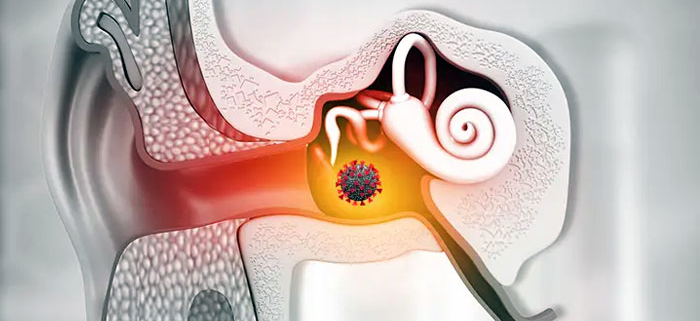Study finds COVID-19 can affect the inner ear
We’ve talked before about the link between COVID-19 and hearing loss, detailing the symptoms, but another recent study has come out describing how coronavirus can infect the inner ear.
The Study
A new study from the Massachusetts Institute of Technology (MIT) and Massachusetts Eye and Ear suggests that COVID-19 can indeed infect cells of the inner ear, including hair cells, which are critical for both hearing and balance.
Viruses such as mumps and hepatitis can all cause deafness, but exactly how they do so is not well-understood.
Professors Lee Gehrke and Konstantina Stankovic were working together on a project to develop cellular models to study infections of the human inner ear. When coronavirus emerged a couple of years ago, the pair changed their plans and started to see patients who were experiencing hearing loss, tinnitus, and dizziness, but who had also tested positive for Covid-19.
They used novel cellular models of the human inner ear that they developed, as well as hard-to-obtain adult human inner ear tissue, for their studies. The limited availability of such tissue has hindered previous studies, however the researchers were able to obtain samples of hard-to-obtain inner ear tissue from patients who were undergoing surgery for a disorder that causes severe attacks of vertigo or for a tumor that causes hearing loss and dizziness.
Science!
Using the model system they were already working on, the pair created their cellular models by taking human skin cells and transforming them into induced pluripotent stem cells.
Then, they were able to stimulate those cells to differentiate into several types of cells found in the inner ear: hair cells, supporting cells, nerve fibers, and Schwann cells, which insulate neurons.
In both the human inner ear samples and the stem-cell-derived cellular models, the researchers found that certain types of cells express the proteins that are needed for the COVID-19 virus to enter the cells.
Attacking the inner ear
Researchers then showed that the virus can actually infect the inner ear, specifically the hair cells, which are involved in sensing head motion and maintaining balance.
While this study strongly suggests that Covid-19 can cause auditory and balance problems, the overall percentage of Covid-19 patients who have experienced ear-related issues is not known.
Possible routes for the virus to enter the ears include the Eustachian tube, which connects the nose to the middle ear. It may also be able to escape from the nose through small openings surrounding the olfactory nerves, entering the brain space and infecting cranial nerves, including the one that connects to the inner ear.
As we learn to live with COVID, we learn more about its effects and treatments as we go.
But whether it’s related to COVID or not, any kind of hearing loss must be seen by a doctor, as soon as possible.
Some types of hearing loss are treatable, but only if you act fast.




Leave a Reply
Want to join the discussion?Feel free to contribute!